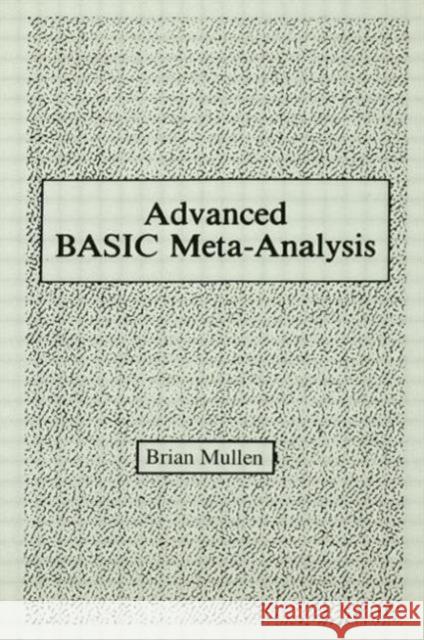Advanced Basic Meta-analysis : Version 1.10 » książka
Advanced Basic Meta-analysis : Version 1.10
ISBN-13: 9780805805024 / Angielski / Twarda / 1989 / 184 str.
In response to the growing emphasis on precision in the summarization and integration of research literature, Advanced BASIC Meta-Analysis presents an overview of strategies, techniques, and procedures used in meta-analysis. The book and software provide an integrated and comprehensive combination of meta-analytic tools for the statistical integration of independent study results. Advanced BASIC Meta-Analysis has three distinct goals: * to provide a clear and user-friendly introduction to the procedures and rules of effective meta-analytic integration; * to present the implicit assumptions and strategies that guide successful meta-analytic integrations; and * to develop a meta-analytic database management system that allows users to create, modify, and update a database, including the relevant statistical information and predictors, for a given research domain. The companion software system allows users to perform a full complement of meta-analytic statistical functions with the speed and flexibility of a database management system. It can also construct a wide array of meta-analytic graphic displays.This text and software package serves as a useful introduction to the quantitative assessment of research domains for those new to meta-analyses. It is also a valuable sourcebook for those who have already conducted meta-analyses.
In response to the growing emphasis on precision in the summarization and integration of research literature, Advanced BASIC Meta-Analysis presents an overview of strategies, techniques, and procedures used in meta-analysis.
The book and software provide an integrated and comprehensive combination of meta-analytic tools for the statistical integration of independent study results. Advanced BASIC Meta-Analysis has three distinct goals:
* to provide a clear and user-friendly introduction to the procedures and rules of effective meta-analytic integration;
* to present the implicit assumptions and strategies that guide successful meta-analytic integrations; and
* to develop a meta-analytic database management system that allows users to create, modify, and update a database, including the relevant statistical information and predictors, for a given research domain.
The companion software system allows users to perform a full complement of meta-analytic statistical functions with the speed and flexibility of a database management system. It can also construct a wide array of meta-analytic graphic displays. This text and software package serves as a useful introduction to the quantitative assessment of research domains for those new to meta-analyses. It is also a valuable sourcebook for those who have already conducted meta-analyses.











